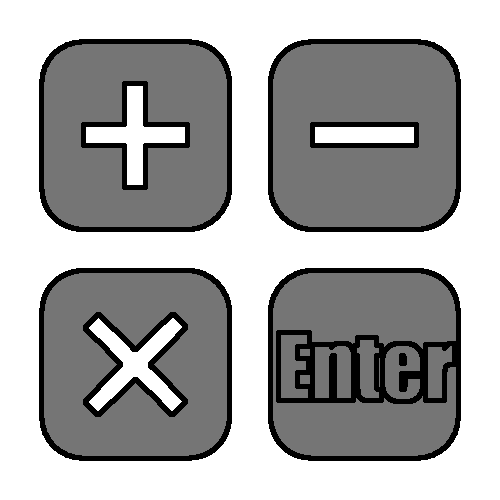
Operands
Operands are the standard symbols used for basic mathematics on numbers. The following is the list of operands supported by RPNCalc. These are also supported by the NumOps shortcut described below.
Math Functions
Except the addition (+) and multiplication (*) operands, the order of the items in the stack is important. It’s fairly intuitive when you look at it in the
calculator, but refer to the following table if needed.
| Operand | Math | Description |
|---|---|---|
| + | Addition | Add line1 and line2 |
| - | Subtraction | Subtract line1 from line2 |
| * | Multiplication | Multiplyline1 and line2 |
| / | Division | Divide line2 by line1 |
| ^ | Exponent | Take line2 to the power of line1 Note that the exponent must be an integer. If it is not, the fractional component will be dropped prior to the calculation |
Simple Examples
Below are two very simple examples that show the order is important
| Line Num | Stack |
|---|---|
line2 | 3 |
line1 | 2 |
Example: The minus - command will execute 3 - 2 and will yield 1
| Line Num | Stack |
|---|---|
line2 | 2 |
line1 | 3 |
Example: Minus - will execute 2 - 3 and will yield -1
Pro-Tip: We’ll discuss commands in later chapters, but the swap command s will swap the top two items in the stack (line1 and line2). Swap will also swap any two
line numbers provided - see the Calculator Commands Chapter for more information.
The NumOps Shortcut
RPNCalc has an important shortcut that can speed up your calculations. You can append one of the above operands at the end of an entered number and the program will, behind
the scenes, place the number on top of the stack (line1) and then execute the operand. The operand must directly follow the number without a space between. For example:
2 [ENTER]
3+ [ENTER]
When the second enter is pressed, the two stack items will be removed, added together, and the result, 5, will be added back. It’s the same as entering this the following
three commands:
2 [ENTER]
3 [ENTER]
+ [ENTER]
As an example of this NumOps shortcut, see the following example:
x = SQRT((((5+3) * 8)/2) ^ 6)
Leveraging the shortcut, this would become:
53+8*2/6^SQRT
By the way, if you were wondering the answer is 32,768.
Please note that you can not use this NumOps shortcut with a fractional number entry or a scientific notation entry